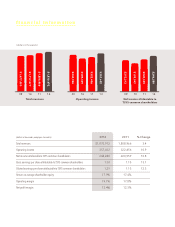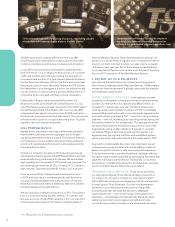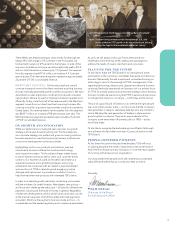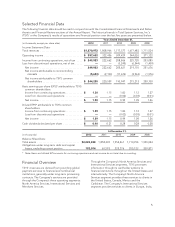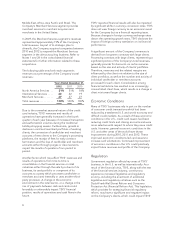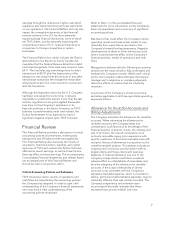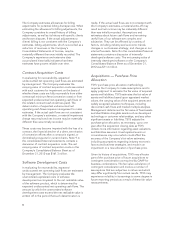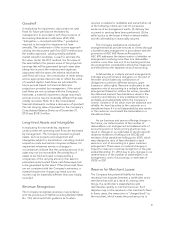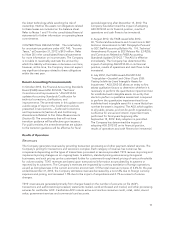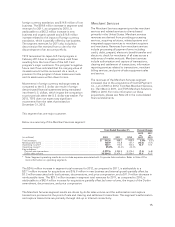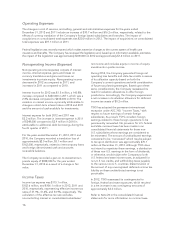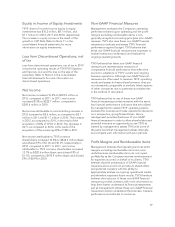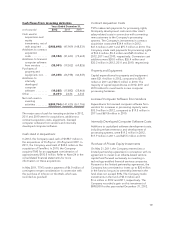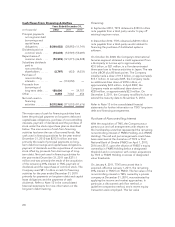NetSpend 2012 Annual Report Download - page 13
Download and view the complete annual report
Please find page 13 of the 2012 NetSpend annual report below. You can navigate through the pages in the report by either clicking on the pages listed below, or by using the keyword search tool below to find specific information within the annual report.refunded to the customer by the card-issuing bank
and charged to the merchant. If the merchant is
unable to fund the refund, TSYS must do so. TSYS
also bears the risk of reject losses arising from the
fact that TSYS collects fees from its merchants on the
first day after the monthly billing period. If the
merchant has gone out of business during such
period, TSYS may be unable to collect such fees.
TSYS maintains cash deposits or requires the pledge
of a letter of credit from certain merchants, generally
those with higher average transaction size where the
card is not present when the charge is made or the
product or service is delivered after the charge is
made, in order to offset potential contingent
liabilities such as chargebacks and reject losses that
would arise if the merchant went out of business.
Most chargeback and reject losses are charged to
cost of services as they are incurred. However, the
Company also maintains a reserve against losses,
including major fraud losses, which are both less
predictable and involve larger amounts. The loss
reserve was established using historical loss rates,
applied to recent bankcard processing volume. At
December 31, 2012, the Company had a merchant
loss reserve in the amount of $906,000.
Transaction Processing Provisions
The Company records estimates to reserve for
contract contingencies (performance penalties) and
processing errors. A significant number of the
Company’s contracts with large clients contain
service level agreements which can result in TSYS
incurring performance penalties if contractually
required service levels are not met. When estimating
these reserves, the Company takes into consideration
such factors as the prior history of performance
penalties and processing errors incurred, actual
contractual penalties inherent in the Company’s
contracts, progress towards milestones, and known
processing errors not covered by insurance. If the
actual performance penalties incurred are not
consistent with the Company’s estimates,
performance penalties and processing errors, which is
recorded in cost of services, may be materially
different than was initially recorded. The Company’s
experience and extensive data accumulated
historically indicates that these estimates have proven
reliable over time.
Income Taxes
In calculating its effective tax rate, the Company
makes decisions regarding certain tax positions,
including the timing and amount of deductions and
allocations of income among various tax jurisdictions.
The Company has various tax filing positions,
including the timing and amount of deductions and
credits, the establishment of reserves for audit
matters and the allocation of income among various
tax jurisdictions.
The Company makes estimates as to the amount of
deferred tax assets and liabilities and records
valuation allowances to reduce its deferred tax assets
to reflect the amount that is more likely than not to
be realized. The Company considers projected future
taxable income and ongoing tax planning strategies
in assessing the need for the valuation allowance.
Actual results may differ from the Company’s
estimates. If the Company realizes a deferred tax
asset or the Company was unable to realize a net
deferred tax asset, an adjustment to the deferred tax
asset would increase or decrease earnings,
respectively, in the period the difference is
recognized.
Related Party Transactions
The Company provides electronic payment
processing and other services to the Company’s
equity investments, Total System Services de México,
S.A. de C.V. (TSYS de México) and China UnionPay
Data Co., Ltd. (CUP Data).
The related party services are performed under
contracts that are similar to its contracts with
unrelated third party customers. The Company
believes the terms and conditions of transactions
between the Company and these related parties are
comparable to those which could have been
obtained in transactions with unaffiliated parties. The
Company’s margins with respect to related party
transactions are comparable to margins recognized in
transactions with unrelated third parties. The amounts
related to these transactions are immaterial. No
significant changes have been made to the method
of establishing terms with the affiliated companies
during the periods presented.
Refer to Note 4 in the consolidated financial
statements for more information on transactions with
affiliated companies.
Off-Balance Sheet Arrangements
OPERATING LEASES: As a method of funding its
operations, TSYS employs noncancelable operating
leases for computer equipment, software and
facilities. These leases allow the Company to provide
10


